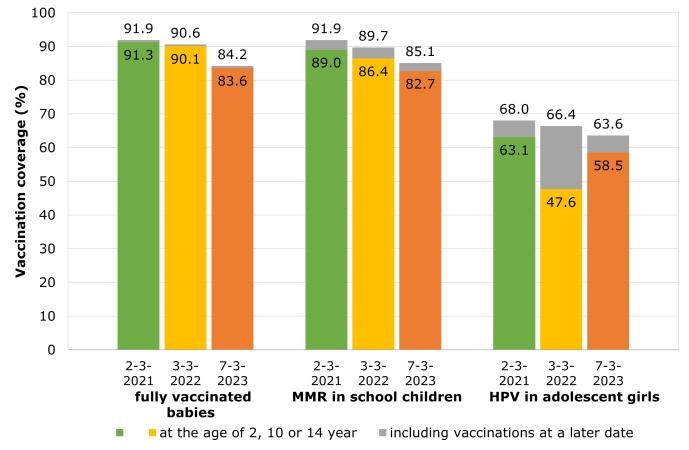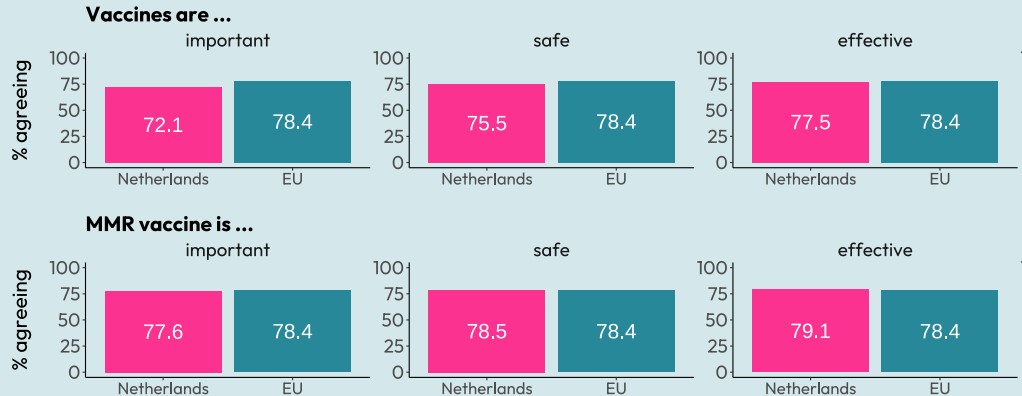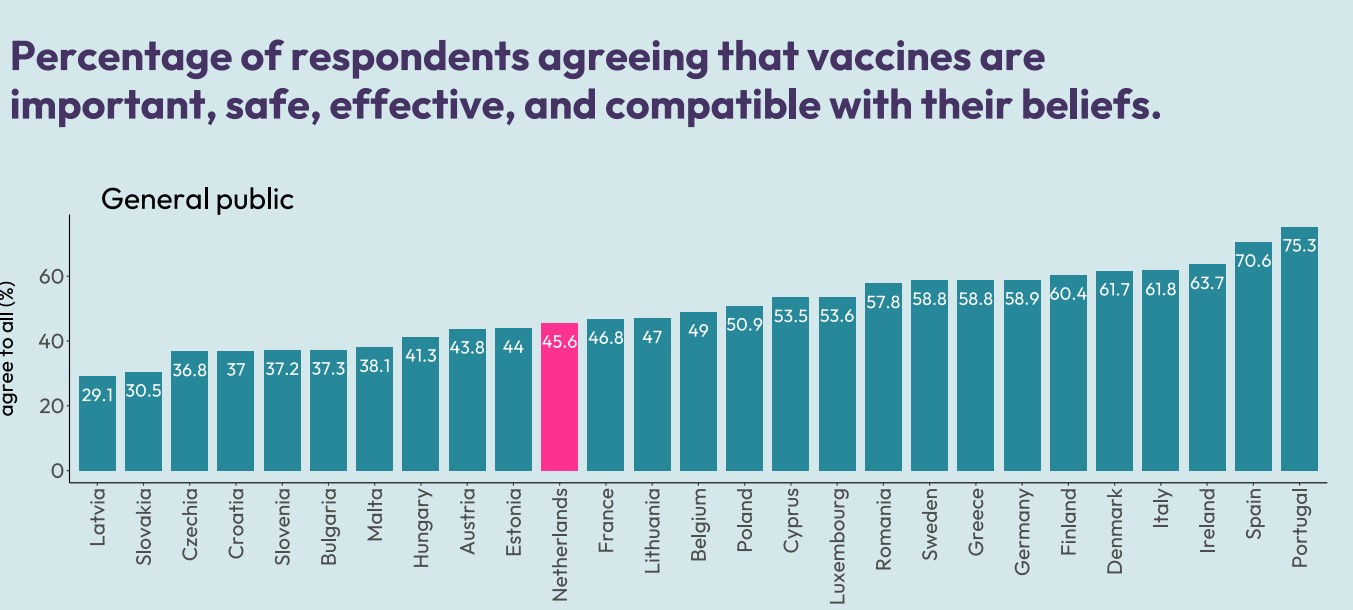The proportion of children in the Netherlands receiving their recommended vaccines has declined for the second year in a row, according to Dutch health authorities. While most children are vaccinated, the Dutch National Institute for Public Health & the Environment (RIVM) is warning about outbreaks of infectious diseases.
Just 83.6% of babies are fully vaccinated on time, down from 91.3% in 2021. There is concern that this trend will carry on into later childhood and adolescence, as data shows that children who miss out on their routine infant immunisations are less likely to present for subsequent vaccinations.
In fact, there is already evidence of a slide among school children having their second MMR vaccine which protects against measles, mumps and rubella, and declining rates of HPV vaccine uptake in early secondary school.

On-time MMR vaccination is just 82.7% ‒ far below the 95% coverage required to achieve herd immunity. Meanwhile, more than one third of girls are missing out on HPV vaccination which prevents cervical and other cancers. The vaccine is offered to boys and girls in the Netherlands.
Lower uptake rates may, at least in part, reflect a dip in vaccine confidence. Data from the European Commission-backed report, State of Vaccine Confidence in the EU, found steep declines in vaccine confidence in the Netherlands last year, along with the Baltic countries and Central & Eastern Europe.
While most people in Europe view vaccines positively, there is a growing age gap, with younger people being more hesitant than older people. The Netherlands is one of the countries where this gap is widest, prompting concerns that younger Dutch parents may be less inclined than previous generations to embrace the routine immunisation schedule.
Comparing its own polling data from 2013 with current data, the RIVM says there are signs that younger parents in the Netherlands are less positive than they once were.

The State of Vaccine Confidence in the EU reports, conducted every two years by the Vaccine Confidence Project, includes country fact sheets which show trends since 2018. The NL fact sheet shows a 9% decline in the number of respondents in the Netherlands who agree that vaccines are safe, and a 15% decline in the number saying vaccines are important.
Confidence among Dutch respondents is below the EU average, particularly for HPV vaccines which are viewed as important by fewer than 64% of people. This is despite 95.5% of healthcare professionals in the Netherlands saying they would recommend the HPV vaccine. 99% of healthcare workers said they would recommend the MMR vaccine.

The Netherlands has faced several crises of confidence in vaccines in the past, but has generally been swift to identify and respond to falling vaccine uptake. The Dutch Cancer Society won an EU prize in 2021 for its geo-targeted information campaign designed to address HPV vaccine misinformation in areas where vaccination rates were low. And authorities have mounted tailored outreach campaigns in response to measles outbreaks in the so-called Dutch Bible Belt and in anthroposophic schools.
Do lower vaccine confidence rates predict outbreaks?
Like the Netherlands, several countries in Europe have also reported lower confidence followed by increased rates of vaccine-preventable disease. For example, 2022 vaccine confidence data for Austria shows rates of confidence at a similarly low level to the Netherlands. Austria has been battling a major measles outbreak in 2023. (One of the more shocking statistics from Austria is that fewer than 80% of healthcare professionals would recommend the MMR vaccine ‒ lower than the percentage of the general public that view the vaccine positively).
And, broadly speaking, uptake of COVID-19 vaccines was lowest in countries that consistently report vaccine confidence at levels below the EU average. Robust vaccine confidence, and insights on vaccine sentiment, may be viewed as an element of a resilient public health system.
European perspectives
A European Commission spokesperson told Vaccines Today that while vaccination policies and services are the responsibility of national authorities, the EU supports efforts to achieve high vaccination coverage rates. ‘Vaccine-preventable diseases know no borders,’ the spokesperson said, pointing to the agreements by health ministers to strengthen cooperation in this area. In addition, the Commission is preparing a proposal for the European Council (made up of EU countries) to step up action on vaccine-preventable cancers. This will include measures to increase uptake of HPV and hepatitis B vaccination, as part of a Prevention Package. These initiatives would complement the Europe Beating Cancer Plan and Joint Action on HPV.

The European Centre for Disease Prevention & Control (ECDC), which tracks disease outbreaks and publishes details of vaccine programmes across the EU, recorded just 127 measles cases last year. (This number has already been surpassed in 2023 by Austria alone.)
The ECDC told Vaccines Today that immunisation programmes in Europe have broadly recovered from a sharp decline in uptake seen in the earliest stages of the COVID-19 pandemic when routine immunisation was de-prioritised. However, it noted the decline in vaccine acceptance across many countries, as well as in other parts of the world. The issue is a complex one, with some communities continuing to face challenges accessing vaccination, while misinformation may be playing a role in some instances.
What’s next?
As Dutch authorities enhance efforts to boost confidence and vaccine uptake, the wider concern for people across Europe interested in public health will be how closely confidence and uptake are linked. If falling confidence really were predictive of subsequent outbreaks, it may be worth noting that there are 10 countries with lower vaccine confidence than the Netherlands.






Pingback
April 27th, 2024
[…] Vaccine Confidence in the EU, a report by the Vaccine Confidence Project, HPV vaccines are already viewed a little differently than infant immunisations (e.g. MMR). And a US study on intention to vaccinate against HPV and […]